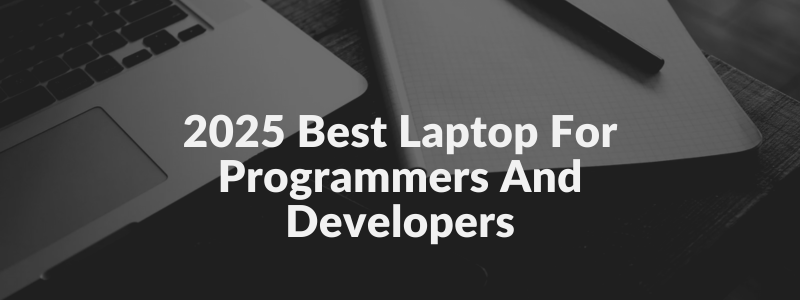Table of Contents

Best Laptops for Programmers and Developers in 2025
2025 best laptop for Programmers and Developers in tech world continues to evolve at a rapid pace, and so do the tools developers rely on. Whether you’re a web developer, data scientist, mobile app creator, or a full-stack engineer, the right laptop can supercharge your productivity. In 2025, the ideal programming laptop isn’t just about raw power—it’s about striking the right balance between performance, portability, battery life, and build quality. Here’s a roundup of the best laptops for developers in 2025 across various use cases and budgets.

1. Apple MacBook Pro 16″ (M3 Max, 2025)
Best for macOS developers and power users
The 2025 MacBook Pro with the M3 Max chip is an absolute beast for developers who work in the Apple ecosystem or need serious performance for machine learning, video processing, or iOS/macOS development.
- CPU/GPU: Apple M3 Max (up to 16-core CPU, 40-core GPU)
- Memory: Up to 128GB Unified RAM
- Storage: Up to 8TB SSD
- Display: 16.2″ Liquid Retina XDR
- Battery Life: Up to 21 hours
- Why it’s great: Blazing fast performance, phenomenal battery life, excellent thermal management, and the best-in-class display.
Downside: Expensive, especially in higher configurations.
2. Dell XPS 15 (2025)
Best all-around Windows laptop for developers
Dell continues its tradition of building high-performance laptops with stunning displays and sturdy design. The 2025 XPS 15 is perfect for devs who need strong CPU/GPU performance in a sleek body.
- CPU: Intel 14th Gen Core i9
- GPU: NVIDIA GeForce RTX 4070
- RAM: Up to 64GB
- Storage: Up to 4TB SSD
- Display: 15.6” 4K OLED
- Why it’s great: Great for developers doing frontend work or game dev, thanks to its vibrant OLED display and solid GPU.
Downside: Can get warm under heavy loads, and the battery life is decent but not amazing with 4K display.
3. Lenovo ThinkPad X1 Carbon Gen 11 (2025)
Best for productivity and Linux-friendly setup
The ThinkPad series has long been a favorite among developers due to its durability and legendary keyboard. The X1 Carbon Gen 11 continues that legacy, combining lightweight portability with reliable performance.
- CPU: Intel 14th Gen Core i7
- RAM: Up to 32GB
- Storage: Up to 2TB SSD
- Display: 14” 2.8K OLED
- Why it’s great: Amazing typing experience, robust build, and excellent Linux compatibility.
Downside: Not built for GPU-intensive tasks.
4. HP Spectre x360 14 (2025)
Best 2-in-1 for developers who value flexibility
If you want a premium convertible that can also serve as a sketchpad for UI/UX mockups or note-taking, the HP Spectre x360 is an elegant and functional pick.
- CPU: Intel Core i7 (13th Gen)
- RAM: Up to 32GB
- Display: 13.5” 3K2K OLED touchscreen
- Battery Life: Up to 15 hours
- Why it’s great: 2-in-1 flexibility, high-resolution touchscreen, and solid performance for everyday development tasks.
Downside: Smaller screen size might not suit everyone.
5. Asus ROG Zephyrus G14 (2025)
Best for game developers and GPU-heavy workloads
This laptop is marketed for gamers, but it’s also a solid option for developers doing GPU-heavy tasks like 3D rendering, AI/ML, or game development.
- CPU: AMD Ryzen 9 (7000 series)
- GPU: NVIDIA RTX 4090
- RAM: Up to 32GB
- Storage: Up to 2TB SSD
- Display: 14″ WQHD, 165Hz
- Why it’s great: Serious power in a relatively compact form, excellent thermals and graphics capabilities.
Downside: On the heavier side for a 14” laptop.
6. Microsoft Surface Laptop Studio 2 (2025)
Best for creative devs and designers
For developers who also dip into design, illustration, or UI/UX prototyping, the Surface Laptop Studio 2 offers a unique form factor with stylus support.
- CPU: Intel 13th Gen Core i7
- GPU: NVIDIA RTX 4060
- RAM: Up to 64GB
- Display: 14.4” PixelSense Flow, 120Hz, Touchscreen
- Why it’s great: Excellent touch and pen input, beautiful display, flexible usage modes.
Downside: Premium pricing and a bit bulky.
7. Lenovo ThinkPad P14s Gen 6 (2025)
Best workstation laptop for data science and AI
This model is geared toward developers who need workstation-grade performance. It’s especially strong for those doing AI, simulation, or data-heavy tasks.
- CPU: AMD Ryzen AI 9 HX Pro
- RAM: Up to 96GB
- Storage: Up to 2TB SSD
- Display: 14” 2.8K OLED
- Why it’s great: AI-optimized performance, enterprise-grade reliability, great for multitasking and heavy workloads.
Downside: Less consumer-oriented design and fewer multimedia features.
8. Razer Blade 18 (2025)
Best large-screen laptop for power users and developers who game
The Blade 18 is a performance monster with desktop-like power, great for developers who game or need lots of screen real estate.
- CPU: Intel Core i9 (14th Gen)
- GPU: NVIDIA RTX 4090
- Display: 18” QHD+ 240Hz
- RAM: Up to 64GB
- Storage: Up to 4TB
- Why it’s great: Massive screen, extreme performance, high refresh rate—great for gaming and development alike.
Downside: Pricey and not very portable.
How to Choose the Best Laptop for Programming in 2025
Here are the key factors to consider when buying a developer-friendly laptop this year:
- Performance (CPU & RAM)
- Look for at least an Intel i7 or Apple M3, with a minimum of 16GB RAM.
- For heavy multitasking, simulations, or compiling large codebases, go for 32GB+.
- Storage (SSD)
- SSDs are a must. 512GB is the minimum; 1TB+ is ideal if you work with large files or VMs.
- Display
- High-resolution (QHD or 4K) helps reduce eye strain and boosts productivity, especially for frontend devs and designers.
- OLED displays are beautiful but may impact battery life.
- Battery Life
- Aim for 10+ hours for true portability—especially important if you work remotely or travel.
- Keyboard and Build Quality
- A comfortable, tactile keyboard and solid build make a huge difference for long coding sessions.
- Ports and Expandability
- Ensure you get enough USB-A/C ports, HDMI, and possibly an SD card reader depending on your workflow.
- OS Compatibility
- Choose what aligns with your development environment—macOS for iOS dev, Windows for .NET, Linux compatibility for open-source and backend work.
Final Thoughts
The best laptop for you ultimately depends on your development focus, preferred OS, and how mobile you need to be. If you’re deep in the Apple ecosystem, the MacBook Pro is unbeatable. For Windows fans, Dell’s XPS and Lenovo’s ThinkPads are tried-and-true options. And if you need something flexible or powerful enough for gaming or AI workloads, there’s no shortage of great picks.
As hardware continues to push boundaries, 2025 offers more options than ever for developers to find their perfect machine—whether you’re building the next big app, crunching data, or crafting stunning user interfaces.

